Explaining "See no evil, hear no evil, speak no evil"
Reviewed and edited by  Lloyd Cooper 01/10/2024, 16:47
Lloyd Cooper 01/10/2024, 16:47
English.me team member
 What does it mean?
What does it mean?

The phrase "See no evil, hear no evil, speak no evil" refers to a proverb and pictorial maxim that encourages people to ignore and avoid acknowledging bad behavior or wrongdoing. It suggests that by refusing to recognize or engage with evil, one can maintain peace and virtue.
 Tone
Tone
Advisory, cautionary Origin
Origin
The phrase originates from a depiction of the Three Wise Monkeys, a visual motif that is derived from a 17th-century carving over a door of the famous Tōshō-gū shrine in Nikkō, Japan. The monkeys" names are Mizaru (see no evil), Kikazaru (hear no evil), and Iwazaru (speak no evil).
 Examples of usage
Examples of usage
- In a corrupt workplace, employees often "see no evil, hear no evil, speak no evil" to avoid conflicts.
- Despite knowing about the issues, they chose the "see no evil, hear no evil, speak no evil" approach.

 English
English español
español française
française italiano
italiano deutsche
deutsche 日本語
日本語 polski
polski česky
česky svenska
svenska Türkçe
Türkçe Nederlands
Nederlands